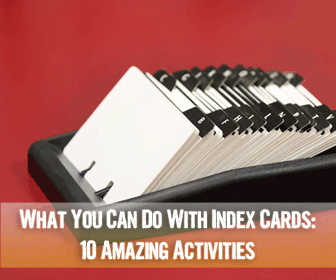Can a simple index card hold the key to a creative language activity for your ESL students?
Read the following 10 ideas before you give your final answer.
10 Things You Can Do With Index Cards
-
1
New Perspective
How you look at life all depends on your perspective, right? If that is the case, why not force a perspective change with this observational activity? Give each of your students an index card, and tell him to poke a hole in the card using a pen or pencil. It should only be big enough for him to see through it a little. Then have each of your students look around the room and write a description of something he sees through the hole (without naming the object). When finished, the rest of the class should listen to the description and try to identify the object.
-
2
Newspaper Headlines
When it is time for your students to learn some new vocabulary or just practice what they already know, look to the newspaper for some inspiration. Cut out interesting individual words from the headlines and tape each on to its own index card. Then have your students each select two to three cards randomly. They should then try to combine the words into a coherent sentence or original newspaper headline. If you like, have your students write the article that follows the headline.
-
3
Why-Because
For a little index card fun, give two cards to each student. On one card, have each student write a question that begins with the word “why”. Then on the second card, he or she should write the answer beginning with “because”. Collect all the ‘why cards’ in one pile and shuffle and do the same with the ‘because cards’. Then pull one card from each pile and read them together. You should end up with some funny combinations. After reading all of them, you can challenge your students to match up each question with an answer that makes sense.
-
4
Who Am I?
Index cards have their place in speaking class, too. Collect one card for each student and put the name of a famous person that your students would know on it. Then tape one name to each student’s back, and he “is” that person. Give your students enough time to walk around the room and ask each other yes/no questions about who they are. (One question per person and then he must move on to another student.) If a person guesses his identity correctly, he may sit down. Keep playing until everyone has guessed who he is.
-
5
Story Starters
If you give your students any free writing time in class, they may sometimes need a nudge in the right direction. When that is the case, have available a stack of story starters (one on each index card) that they can pull and use when they are looking for inspiration. When she is finished writing, have your student turn in her story with her card paper clipped to the top for your review or designate an area of the classroom to post original stories.
-
6
Memory Game
Memory is another simple game you can play with index cards. This is especially useful when reviewing vocabulary. Simply write each vocabulary word on one card and its definition on another. Shuffle the cards and place them face down on a table. Each person can turn over two cards on his turn. If he is able to match the word to its definition, he may keep the set and go again.
-
7
Antonyms
When you want to make the memory game a little more challenging, instead of matching words to their definitions, match words to their antonyms. Your students will still get practice using their vocabulary words as well as challenging their memories.
-
8
Order, Please!
If you want to cast a wider net than isolated vocabulary, write one sentence of a narrative on each card. Then challenge groups of students to use transitional words and signal words to put the sentences in the correct order.
-
9
Take 5 Notes!
Anytime your students are doing research, index cards are a functional and flexible place to take notes. You can find information on how to take notes on Busy Teacher or teach your students your preferred method for taking notes. Challenge them to read a magazine article and take at least five notes on index cards, and then have them use those cards as part of a larger research assignment. They will have the flexibility to rearrange notes as they like without losing valuable information in a cumbersome notebook.
-
q
Oh, How Practical!
Index cards do not have to be relegated to the world of fun and games. They have practical uses as well. They are a concise place to keep emergency contact and allergy information about your students. It is especially helpful to have this information in one place should you ever need a substitute teacher.
When you can get one hundred index cards for only a dollar, the possibilities for your ESL class can be endless as well as inexpensive. The next time you are looking for some inspiration, shuffle on down to your local store and get a back of the 3x5 wonders.
With a little creativity and some blank cards, your ESL class can do more than you might think.
P.S. If you enjoyed this article, please help spread it by clicking one of those sharing buttons below. And if you are interested in more, you should follow our Facebook page where we share more about creative, non-boring ways to teach English.








